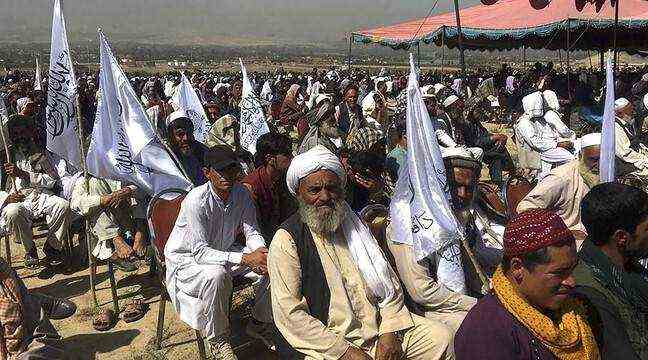Nearly 1,000 people took part this Sunday in the suburbs of Kabul in a first victory rally organized in the capital by the Taliban, anxious to establish their military authority but also now civil, seven weeks after taking the reins of the country. The rally was held in Kohdaman commune, on the edge of the Afghan capital from which the Taliban had been kept at bay during two decades of US military intervention.
Under tarpaulins erected in the middle of an empty lot, about 1,000 people, only men or boys, took their places, on rows of chairs or on the ground. Outside, dozens of heavily armed guards surrounded the rally, while Taliban fighters arrived in pickups. “America defeated. Impossible. Impossible. But possible! », Trumpeted one of the songs broadcast to welcome them in a rare musical event, theoretically prohibited by the Islamist movement.
Mostly disarmed participants
The rally then began solemnly with a procession of men in combat gear, all armed, displaying the white Taliban flag with the Muslim profession of faith inscribed in black, and for some, rocket launcher on their shoulders. The participants in the rally, civilians dressed in traditional Taliban clothes or at least a headdress, were mostly unarmed. When the organizers arrived, they started a traditional “takbir”, the religious formula “Allah Akbar” (God is the greatest) repeated several times. Some also launched pro-Taliban slogans.
Seven weeks after the lightning seizure of power by the Islamist fighters, “the Islamic Emirate”, the new regime decreed by the Taliban, is seeking to establish its legitimacy with the population, as with the rest of the nations. Thousands of Afghans, including a large part of the opposition fearing the abuses of the Islamist movement, have already fled the country. In the country, civil opposition to the Taliban has become de facto impossible. All demonstrations have been banned by the new power since September 8 and offenders threatened with “severe legal action”.
The Taliban formed a government at the beginning of August, headed by Mohammad Hassan Akhund, a former close associate of the founder of the movement, Mullah Omar, who died in 2013. All the members of this cabinet are Taliban and almost all belong to the Pashtun ethnic group. This new government is now faced with the challenge of civilian management in a country that is completely paralyzed economically and threatened by a serious humanitarian crisis. No country has yet recognized the new regime put in place in Afghanistan, although Pakistan, China and Qatar have shown some signs of openness.

